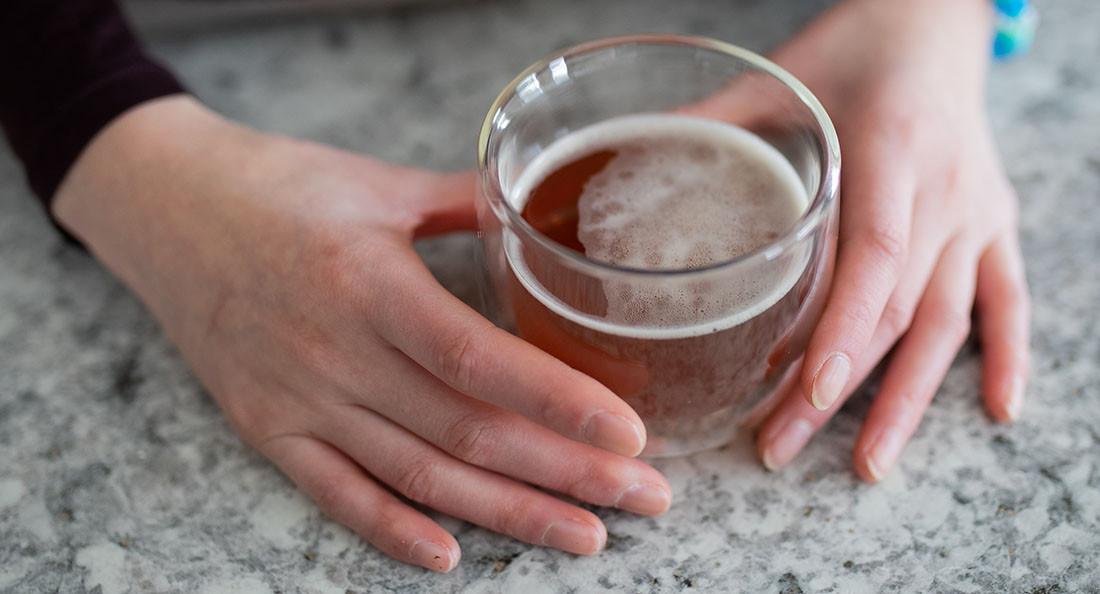Zero proof possible
More options, growing demand for local non-alcoholic beverages
Bre Kelly’s favourite drink to make at home for herself is an espresso martini. Minus the alcohol.
Kelly, 34, is one of the many Manitobans hopping on the “sober curious” movement that started around 2018 but has made its way into the province more in the past few years.
She decided to go sober 14 months ago and has no plans of returning to alcohol in the future. She was taking hormones – one of which also acted as a blood thinner – and was figuring out her new alcohol tolerance.
She wanted to remove alcohol from her lifestyle and reevaluate and “interrogate” her relationship with the substance during her transition.
“Navigating the world as a femme-presenting person, period, can be kind of terrifying sometimes,” Kelly says. “I definitely wanted to think about removing those additional layers of fear.”
She says everyday life stresses made it easy to rely on having a glass of wine or a cold beer to unwind after coming home from a long day.
Some of her social circles relied on alcohol to keep them together, also contributing to how often she drank. She wanted to find new ways to hold friendships together, without using alcohol as the glue.
But Kelly’s sobriety led to a disconnection with some of her social groups that would go out to bars to socialize. Eventually, they just stopped inviting her. She thinks they might have felt like they were pressuring her into something she didn’t want to do.
“I think it’s a little strange that we’re sort of conditioned to think that the only way to socialize is with alcohol,” Kelly says. “The more establishments that have alcohol-free options, it just helps to not only include people who are ... choosing a sober existence. It also sort of takes away that layer of necessity of alcohol for social interaction.”
A few months after fully cutting alcohol out of her life, Kelly adopted her dog, Keanu, who she says has helped give her a sense of purpose, even while living on her own.
“Discovering that I’m fun because I’m fun, I’m not fun because I’m drinking, has been a big thing, too,” Kelly says. “I made this choice for me, and I don’t anticipate or expect anyone to follow suit.”
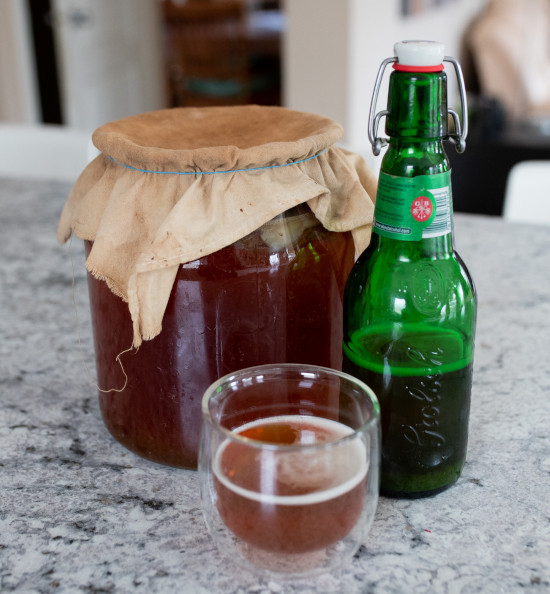
Homemade kombucha, courtesy of Emma Ko’s mom
No alcohol, no questions asked
Kelly’s philosophy on drinking echoes DrinkSense Manitoba’s recent campaign. DrinkSense, an extension of Manitoba
Liquor and Lotteries, ran their Mocktail Week campaign from Feb. 22 to March 17, encouraging Manitobans to give non-alcoholic options a try, even for one night.
“It really is about positive experiences when (people) do choose to drink, and enjoying a mocktail ... is a really great way to do that,” a DrinkSense spokesperson says. “You don’t need alcohol to have a good time. It’s your choice, no questions asked.”
The spokesperson says having high-quality, interesting drink options helps those choosing to not drink feel more included in the fun with less pressure to drink. She adds that her favourite non-alcoholic drink is a jalapeno cherry mocktail.
Mocktail Week featured recipes without any type of alcohol on the ingredients list to make at home.
But for those not keen on making their own drinks, Manitoba’s locally made non-alcoholic options have boomed in the last few years.
brite water, brewed by Little Brown Jug Brewing Company (LBJ) in Winnipeg’s downtown, gives patrons an option in the pub that isn’t beer or cider.
“There was a big gap in the market in terms of a local, non-alcoholic sparkling product,” Jensen Maxwell, LBJ’s marketing and events coordinator, says. “Naturally flavoured sparkling water seemed like kind of the obvious answer.”
They say the move to create brite water has helped create a more inclusive environment at LBJ.
“When you come to a brewery, you kind of expect, if you don’t drink alcohol, that you won’t have anything available for you,” Maxwell says. “It’s really nice to walk into the space and go, “Oh, there is something for me.”
They add that everyone who tries brite water has a strong opinion about their favourite flavour, but theirs is the peach mango. Outside of LBJ’s creations, Maxwell also enjoys a non-alcoholic bourbon peach drink from an event hosted by Søbr Market.
Other restaurants like The Roost on Corydon have offered handmade mocktails for years, while places like Amsterdam Tea Room and The Common also offer ze- ro-proof menus for those who don’t want to drink.
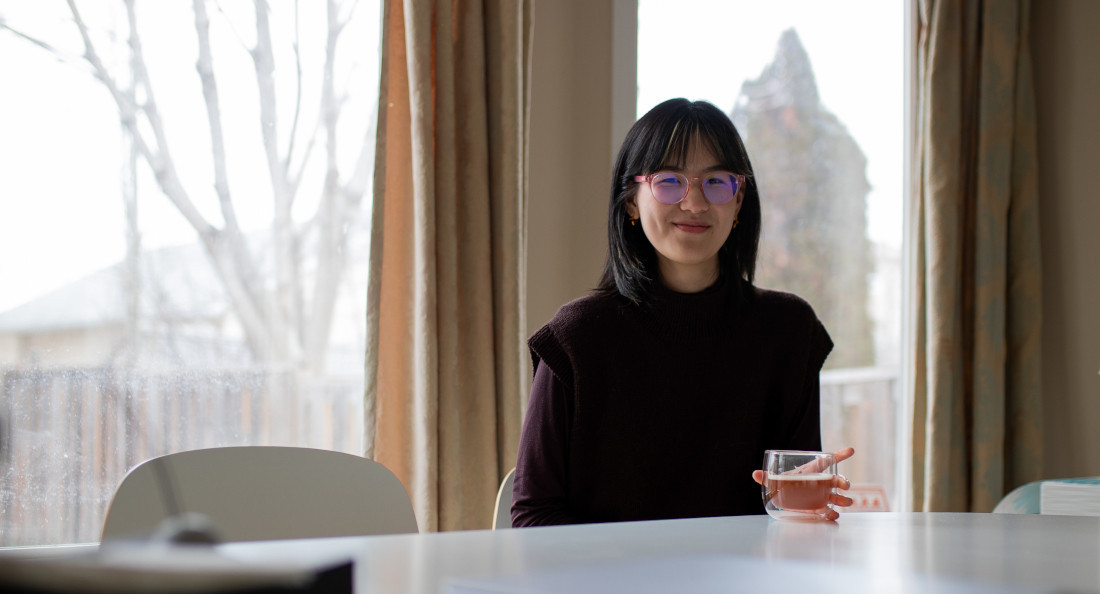
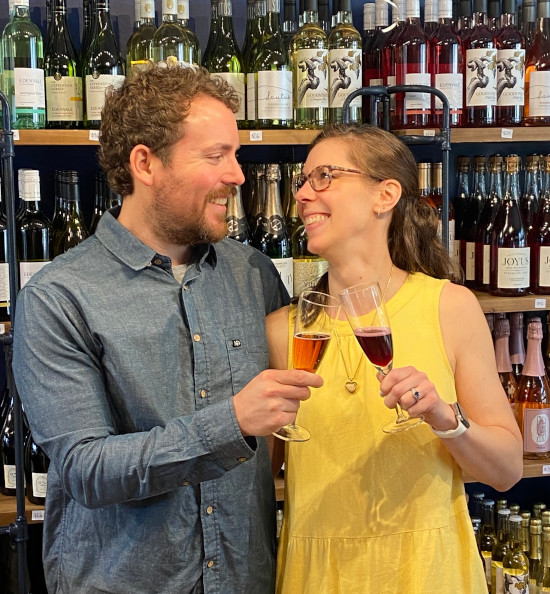
Shane and Jessie Halliburton make a toast in their store, Søbr Market. - Supplied photo
Local non-alcoholic options expanding
Shane Halliburton, co-owner of Søbr Market, stopped drinking alcohol just over two years ago. He says he used to think it was normal to drink excessively.
Halliburton says his priorities changed when he and his wife and Søbr Market co-owner, Jessie, had kids. Jessie also chooses to not drink alcohol.
“There’s no longer time to feel tired or groggy the next day, and how unfair is that to your children?” Halliburton says. “They deserve 100 per cent energy and attention, and I want to give that to them.”
He also stopped drinking pop 12 years ago and was left with very few options besides sparkling water. He and his wife realized there must be other Winnipeggers with similar experiences and launched their website in June 2022.
He says the response was bigger than they anticipated and grew until they opened a storefront on Academy and in Toronto. The Toronto store is currently closed for renovations to expand to meet the growing demand.
They now plan to have six stores open by 2025 across Canada.
When they started, Halliburton says there were very few non-alcoholic options outside of water, juice and pop made in Winnipeg or the rest of Canada. Most of the drinks were imported from Europe or the United States.
It’s easier to find and stock items made in Canada now, but they still import from all around the world. Recently, he’s noticed more places making non-alcoholic spirits, like gin, whisky and tequila.
Since expanding to carry more than 700 products, Halliburton says he can’t possibly pick one drink he likes best.
“To pick a favourite, it’s just something I can’t do anymore,” he says. “It all depends on what kind of mood you’re in and what you’re looking for.”
Although Halliburton is comfortable sharing his reasons for not drinking, he says it’s important that no one at Søbr Market ever asks someone their reasons for limiting how much they drink or cutting alcohol out completely.
Feeling included in socializing regardless of whether you’re sober or not is important, Halliburton says. Often, manufacturers create packing for non-alcoholic beverages that mimic alcoholic drink designs to help people blend in and avoid questioning.
This helps remove stigma for those not drinking. People are asking why someone is not drinking less, Halliburton says.
“It used to be, if you weren’t drinking alcohol, it would be, “What is wrong with you? Why aren’t you drinking?’” he says. “That’s kind of slowing down lately.”
Halliburton says no specific demographic is joining the sober-curious movement more than others. People from a wide range of ages frequent the store, but he sees younger generations embracing it a little more.
Although Statistics Canada data shows Canadians aged 19 to 34 years were most likely to report heavy drinking in 2021, those numbers are down 10 per cent from 2020. They are also lower compared to the one-third of that demographic that said they drank heavily in 2015.
Emma Ko, 22, prefers water when her friends go to LBJ after class and only drinks alcohol a few times each year. Even then, she always limits herself to one drink.
The first-year Creative Communications student at Red River College Polytechnic has many reasons for not drinking.
Data from the Canadian Centre on Substance Use and Addiction released in 2023 shows a link between frequent drinking and an increased risk for heart disease, stroke and cancer. Canada’s Guidance on Alcohol and Health says having seven or more drinks per week “radically” heightens these risks.
Ko finds the habit expensive and doesn’t like the taste of alcohol. She’s concerned about health effects and generally dislikes the culture around drinking.
“This isn’t the case for everyone, but a lot of people can’t have fun unless they’re drinking,” Ko says. “If you are with a group of people and you can’t genuinely have fun unless you’re drinking, you’re not friends with the right people.”
Her parents only drink socially and have a healthy relationship with alcohol, which also influenced her decision to stay sober.
She feels no pressure from friends to drink and feels confident in the boundaries she sets around the substance. Ko is curious to know what she would be like drunk but doesn’t find the process of getting drunk appealing.
“I don’t ever want to be drunk to the point where I can’t walk properly and I’m so dizzy,” Ko says. “That type of feeling is so scary, especially with the way women kind of have to be a little more careful.”
Ko believes younger generations are more accepting and kind about others’ decisions. She also thinks they are more comfortable with others not drinking.
Although she prefers to save her money and stick to water, or drink her mom’s homemade guava kombucha, Ko likes to see more restaurants and bars offering mocktail options.
“Having (non-alcoholic drinks) in restaurants and having restaurants kind of promote it also helps push the culture of ‘you don’t have to drink to have fun.’”
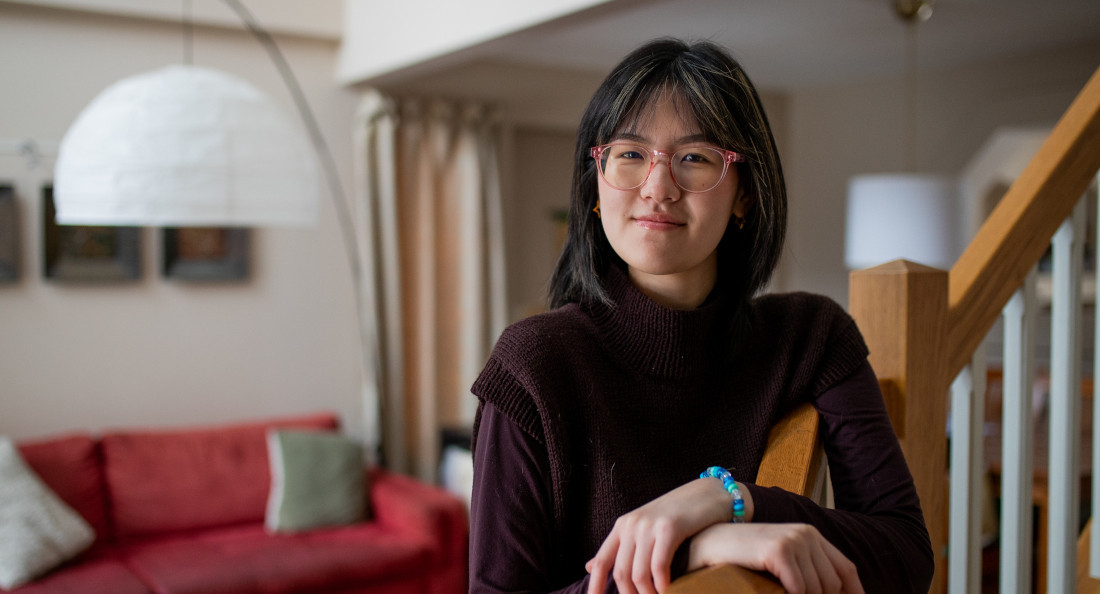
Emma Ko generally dislikes the culture around drinking.
Published in Volume 78, Number 22 of The Uniter (March 21, 2024)

